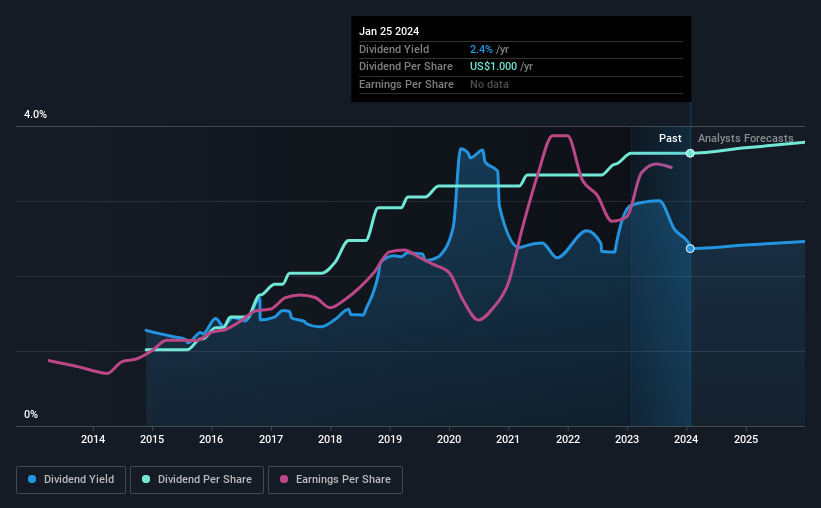The board of Home Bancorp, Inc. (NASDAQ:HBCP) has announced that it will pay a dividend of $0.25 per share on the 16th of February. This means the annual payment will be 2.4% of the current stock price, which is lower than the industry average.
Check out our latest analysis for Home Bancorp
Home Bancorp's Payment Expected To Have Solid Earnings Coverage
Even a low dividend yield can be attractive if it is sustained for years on end.
Home Bancorp has a good history of paying out dividends, with its current track record at 9 years. While past records don't necessarily translate into future results, the company's payout ratio of 19% also shows that Home Bancorp is able to comfortably pay dividends.
EPS is set to fall by 23.9% over the next 3 years. Despite that, analysts estimate the future payout ratio could be 24% over the same time period, which is in a pretty comfortable range.

Home Bancorp Doesn't Have A Long Payment History
The dividend's track record has been pretty solid, but with only 9 years of history we want to see a few more years of history before making any solid conclusions. Since 2015, the dividend has gone from $0.28 total annually to $1.00. This means that it has been growing its distributions at 15% per annum over that time. The dividend has been growing rapidly, however with such a short payment history we can't know for sure if payment can continue to grow over the long term, so caution may be warranted.
The Dividend Looks Likely To Grow
Some investors will be chomping at the bit to buy some of the company's stock based on its dividend history. Home Bancorp has seen EPS rising for the last five years, at 11% per annum. Home Bancorp definitely has the potential to grow its dividend in the future with earnings on an uptrend and a low payout ratio.
Home Bancorp Looks Like A Great Dividend Stock
In summary, it is good to see that the dividend is staying consistent, and we don't think there is any reason to suspect this might change over the medium term. The earnings easily cover the company's distributions, and the company is generating plenty of cash. However, it is worth noting that the earnings are expected to fall over the next year, which may not change the long term outlook, but could affect the dividend payment in the next 12 months. Taking this all into consideration, this looks like it could be a good dividend opportunity.
Market movements attest to how highly valued a consistent dividend policy is compared to one which is more unpredictable. At the same time, there are other factors our readers should be conscious of before pouring capital into a stock. To that end, Home Bancorp has 2 warning signs (and 1 which is concerning) we think you should know about. If you are a dividend investor, you might also want to look at our curated list of high yield dividend stocks.
Valuation is complex, but we're here to simplify it.
Discover if Home Bancorp might be undervalued or overvalued with our detailed analysis, featuring fair value estimates, potential risks, dividends, insider trades, and its financial condition.
Access Free AnalysisHave feedback on this article? Concerned about the content? Get in touch with us directly. Alternatively, email editorial-team (at) simplywallst.com.
This article by Simply Wall St is general in nature. We provide commentary based on historical data and analyst forecasts only using an unbiased methodology and our articles are not intended to be financial advice. It does not constitute a recommendation to buy or sell any stock, and does not take account of your objectives, or your financial situation. We aim to bring you long-term focused analysis driven by fundamental data. Note that our analysis may not factor in the latest price-sensitive company announcements or qualitative material. Simply Wall St has no position in any stocks mentioned.
About NasdaqGS:HBCP
Home Bancorp
Operates as the bank holding company for Home Bank, National Association that provides various banking products and services in Louisiana, Mississippi, and Texas.
Flawless balance sheet with solid track record and pays a dividend.
Market Insights
Community Narratives




